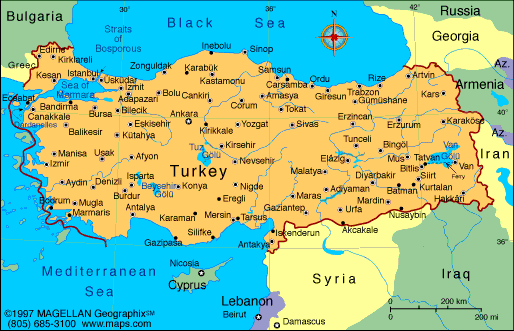TURKEY

Geography: Turkey is at the northeast end of the Mediterranean Sea in southeast Europe and southwest Asia. To the north is the Black Sea and to the west is the Aegean Sea. Its neighbors are Greece and Bulgaria to the west, Russia, Ukraine, and Romania to the north and northwest (through the Black Sea), Georgia, Armenia, Azerbaijan, and Iran to the east, and Syria and Iraq to the south. The Dardanelles, the Sea of Marmara, and the Bosporus divide the country. Turkey in Europe comprises an area about equal to the state of Massachusetts. Turkey in Asia is about the size of Texas. Its center is a treeless plateau rimmed by mountains.
Government: Republican parliamentary democracy.
History: Anatolia (Turkey in Asia) was occupied in about 1900 B.C. by the Indo-European Hittites and, after the Hittite empire's collapse in 1200 B.C. , by Phrygians and Lydians. The Persian Empire occupied the area in the 6th century B.C. , giving way to the Roman Empire, then later the Byzantine Empire. The Ottoman Turks first appeared in the early 13th century, subjugating Turkish and Mongol bands pressing against the eastern borders of Byzantium and making the Christian Balkan states their vassals. They gradually spread through the Near East and Balkans, capturing Constantinople in 1453 and storming the gates of Vienna two centuries later. At its height, the Ottoman Empire stretched from the Persian Gulf to western Algeria. Lasting for 600 years, the Ottoman Empire was not only one of the most powerful empires in the history of the Mediterranean region, but it generated a great cultural outpouring of Islamic art, architecture, and literature.
After the reign of Sultan Süleyman I the Magnificent (1494–1566), the Ottoman Empire began to decline politically, administratively, and economically. By the 18th century, Russia was seeking to establish itself as the protector of Christians in Turkey's Balkan territories. Russian ambitions were checked by Britain and France in the Crimean War (1854–1856), but the Russo-Turkish War (1877–1878) gave Bulgaria virtual independence and Romania and Serbia liberation from their nominal allegiance to the sultan. Turkish weakness stimulated a revolt of young liberals known as the Young Turks in 1909. They forced Sultan Abdul Hamid to grant a constitution and install a liberal government. However, reforms were no barrier to further defeats in a war with Italy (1911–1912) and the Balkan Wars (1912–1913). Turkey sided with Germany in World War I, and, as a result, lost territory at the conclusion of the war.

Map of Turkey
President: Recep Tayyip Erdogan (2014)
Prime Minister: Ahmet Davutoglu
(2014)
Land area: 297,591 sq mi (770,761 sq km);
total area: 301,382 sq mi (780,580 sq km)
Population (July 2014 est.): 81,619,392 (growth
rate: 1.12%); birth rate: 16.86/1000; infant mortality rate: 21.43/1000;
life expectancy: 73.29
Capital (2011 est.):
Ankara, 4.194 million
Largest cities: Istanbul,
11.253 million; Izmir, 2.927 million;
Bursa, 1.713 million; Adana, 1.468 million, Gaziantep 1.198 million.
Monetary unit: Turkish lira (YTL)
Republic of Turkey
National
name: Türkiye Cumhuriyeti
Languages:
Turkish (official), Kurdish, other minority languages
Ethnicity/race:
Turkish 70-75%, Kurdish 18%, other minorities 7-12% (2008 est.)
Religions:
Islam (mostly Sunni) 99.8%, other 0.2% (mostly
Christians and Jews)
Literacy rate:
94.1% (2011 est.)
Economic summary:
GDP/PPP (2013 est.): $1.167 trillion; per capita $15,300. Real
growth rate: 3.8%. Inflation: 7.6%. Unemployment:
9.3%. Arable land: 26.21%.
Agriculture: tobacco, cotton, grain, olives, sugar beets, hazelnuts, pulses, citrus; livestock. Labor force: 27.91 million (2013 est.);
note: about 1.2 million Turks work abroad; agriculture 25.5%, industry
26.2%, services 48.4% (2010). Industries:
textiles, food processing, autos, electronics, mining (coal, chromite,
copper, boron), steel, petroleum, construction, lumber, paper.
Natural resources: coal, iron ore, copper,
chromium, antimony, mercury, gold, barite, borate, celestite
(strontium), emery, feldspar, limestone, magnesite, marble, perlite,
pumice, pyrites (sulfur), clay, arable land, hydropower. Exports:
$167.6 billion (2013 est.): apparel, foodstuffs, textiles,
metal manufactures, transport equipment. Imports: $242.9
billion (2013 est.): machinery, chemicals, semi-finished goods,
fuels, transport equipment. Major trading partners: Germany,
UK, Russia, U.S., Italy, France, Russia, China, Iraq, Iran, UAE (2012).
Communications: Telephones: main lines in
use: 13.86 million (2012); mobile cellular: 67.68 million (2012).
Broadcast media: national public broadcaster
Turkish Radio and Television Corporation (TRT) operates multiple TV and
radio networks and stations; multiple privately-owned national
television stations and up to 300 private regional and local television
stations; multi-channel cable TV subscriptions are obtainable; more
than 1,000 private radio broadcast stations (2009). Internet Service Providers (ISPs): 7.093 million (2012).
Internet users: 27.233 million (2009).
Transportation: Railways: total: 12,008 km
(2012). Highways: total: 385,748 km; paved: 352,268 km; unpaved: 33,486 km (2012).
Waterways: about 1,200 km (2010). Ports and harbors: .Aliaga, Ambarli, Diliskelesi, Eregli, Izmir, Kocaeli (Izmit), Mersin (Icel), Limani, Yarimca Airports: 98 (2013).
International disputes:
complex maritime, air, and territorial disputes with Greece in the
Aegean Sea; status of north Cyprus question remains; Syria and Iraq
protest Turkish hydrological projects to control upper Euphrates
waters; Turkey has expressed concern over the status of Kurds in Iraq;
in 2009, Swiss mediators facilitated an accord reestablishing
diplomatic ties between Armenia and Turkey, but neither side has
ratified the agreement and the rapprochement effort has faltered;
Turkish authorities have complained that blasting from quarries in
Armenia might be damaging the medieval ruins of Ani, on the other side
of the Arpacay valley.
-------------------- o --------------------
No comments:
Post a Comment